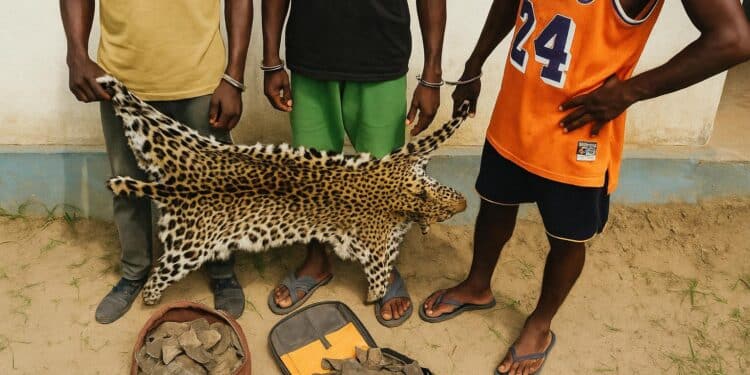A courtroom moment with regional echoes
On 26 June, the Tribunal of Grande Instance in Impfondo handed down custodial sentences of two to three years to three Congolese nationals found guilty of possessing and attempting to market trophies from fully protected species. The ruling, greeted with restrained approval by conservation officials present in the wood-panelled courtroom, represents one of the most explicit reaffirmations of Law 37-2008 on wildlife and protected areas since its promulgation fifteen years ago (Agence Congolaise d’Information, 27 June 2023).
Legal foundations of wildlife protection
Law 37-2008 draws on Congo-Brazzaville’s constitutional duty to safeguard biodiversity and mirrors commitments contained in the CITES convention ratified by Brazzaville in 1983. Its wording leaves minimal interpretive space: import, export, transit or detention of trophies from species such as Panthera pardus and Smutsia gigantea are strictly prohibited except under tightly circumscribed scientific exemptions. The maximum sanction can reach five years’ imprisonment, placing the Likouala verdict in the medium range of the statute’s punitive spectrum and signalling judicial proportionality rather than an exemplary show of force.
From arrest to verdict in Likouala
According to gendarmerie filings presented in court, Jodel Mouandola and Arel Ebouzi were apprehended on 27 May in downtown Impfondo while transporting a leopard skin rolled inside a grain sack alongside a cache of pangolin scales and four claws. Interrogation led investigators to Parfait Mbekele in Épéna-Centre, identified as the consignment’s owner. The operation, executed jointly by the Departmental Directorate of Forestry Economy and the Project for Law Enforcement on Wildlife (PALF), unfolded without incident, reinforcing a pattern of civil-military coordination reported in previous seizures in Ouesso and Pokola (Wildlife Conservation Society, 2022).
Regional significance and diplomatic optics
While the quantities recovered in Likouala were modest compared with multi-tonne ivory interceptions in Central Africa, the symbolic value of the verdict has not escaped regional observers. Cameroon, Gabon and the Central African Republic have all tightened sentencing in the last three years, in part to comply with the 2021 Brazzaville Roadmap on Transboundary Wildlife Crime. By demonstrating that dispositional hearings can be concluded within a month of arrest, the Congolese judiciary projects procedural efficiency likely to resonate in forthcoming Central African Forest Commission exchanges.
Foreign diplomats posted to Brazzaville emphasise that predictable legal outcomes remain critical to donor confidence. A senior European Union official, requesting anonymity because negotiations on a renewed ‘FLEGT-style’ partnership are ongoing, remarked that “credible, swift and proportionate rulings are as important as ranger deployments when Brussels evaluates conservation benchmarks”.
Conservation economics and community stakes
The economic backdrop in Likouala cannot be ignored. With average household revenues hovering below 1,600 USD annually (World Bank, 2022), the temptation to monetise high-value skins or scales persists. Pangolin keratin can fetch up to 1,000 USD per kilogramme once it leaves the continent, dwarfing local incomes. Prosecutors in the case argued that a firm custodial message, combined with civil damages amounting to four million CFA francs, would marginally diminish the perceived benefit-to-risk ratio among would-be traffickers.
At the community level, civil society groups such as Organisation pour le Développement et les Droits Humains au Congo underline that jurisprudence alone will not suffice. They advocate parallel livelihood initiatives—beekeeping pilots near Epena and ecotourism concessions along the Oubangui River—aimed at converting the notion of ‘protection’ from legal imperative to tangible economic opportunity.
Governance, continuity and sustainable enforcement
The Likouala ruling dovetails with Brazzaville’s 2022-2026 National Biodiversity Strategy, a document that frames wildlife protection as both a sovereignty issue and a prerequisite for long-term green growth. Government spokesperson Thierry Moungalla recently reaffirmed that enhanced judicial capacity constitutes a pillar of President Denis Sassou Nguesso’s broader governance agenda, one that aims to square environmental stewardship with macro-economic diversification.
Yet implementation challenges loom. Logistics in a department larger than Portugal but served by limited road infrastructure complicate post-trial monitoring. Conservation NGOs stress the importance of continuing to fund mobile courts and remote magistrate residencies so that rulings of this nature do not remain urban exceptions.
The three convicted men have opted not to appeal, a decision confirmed by court clerks on 20 July. As they begin their sentences in the Impfondo correctional facility, prosecutors are already reviewing two new dossiers involving ivory tusks seized near the CAR border. The judiciary’s handling of those cases will offer an early barometer of whether the momentum generated in June can be sustained.
Balancing sovereignty and multilateral expectations
Congo-Brazzaville’s government is keenly aware that conservation credentials now intersect with access to climate finance. International partners—from the Green Climate Fund to bilateral lenders—place rule-of-law indicators alongside carbon metrics when assessing proposals. In that context, each domestic verdict doubles as a diplomatic cable, signalling the Republic’s readiness to shoulder enforcement costs on its own soil.
Against that backdrop, the Likouala judgement may appear a modest legal episode. Yet it underscores a jurisprudential continuity that investors and donors increasingly interpret as a proxy for overall governance stability. For Brazzaville, ensuring that continuity may be as consequential as the sentence length inscribed on a single courtroom ledger.










































